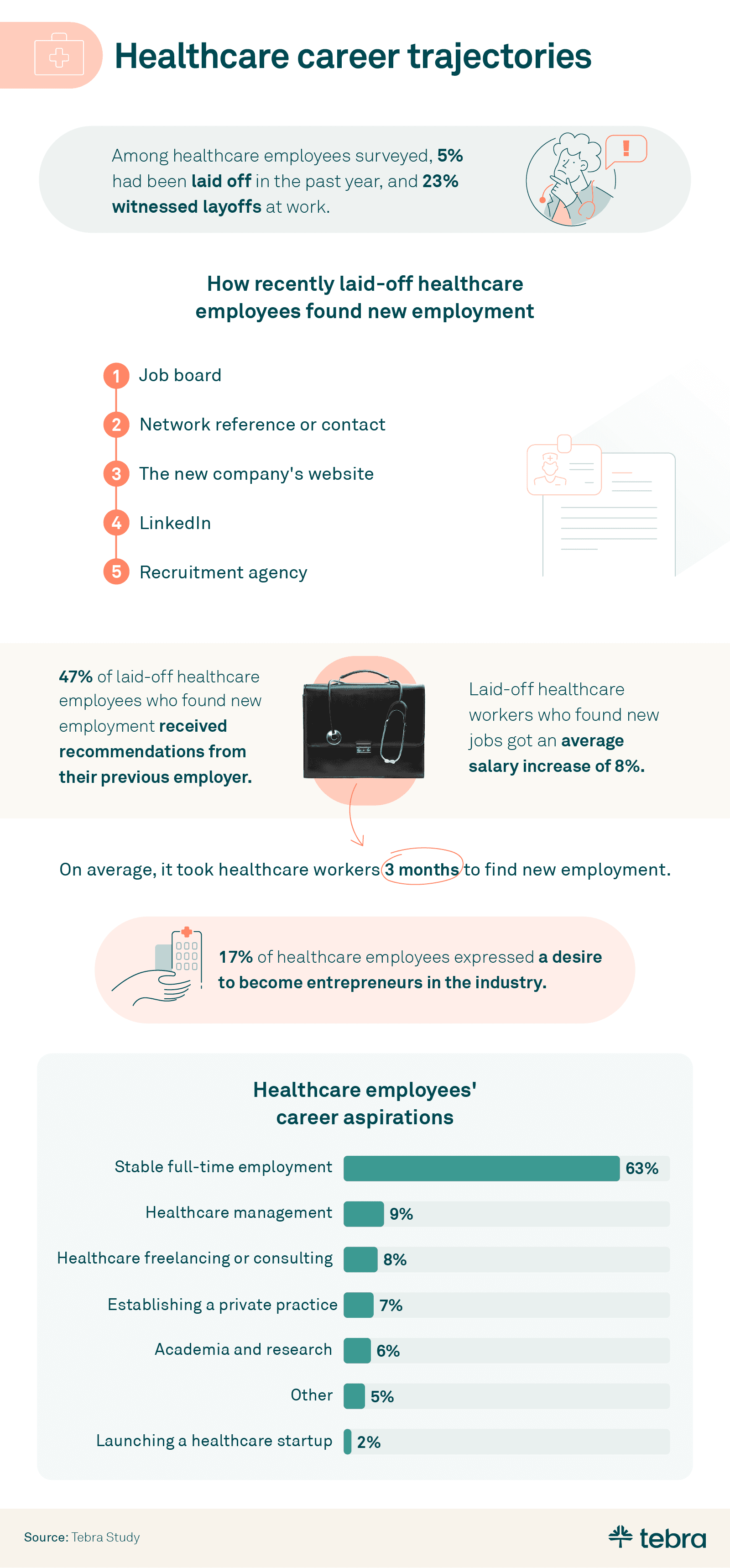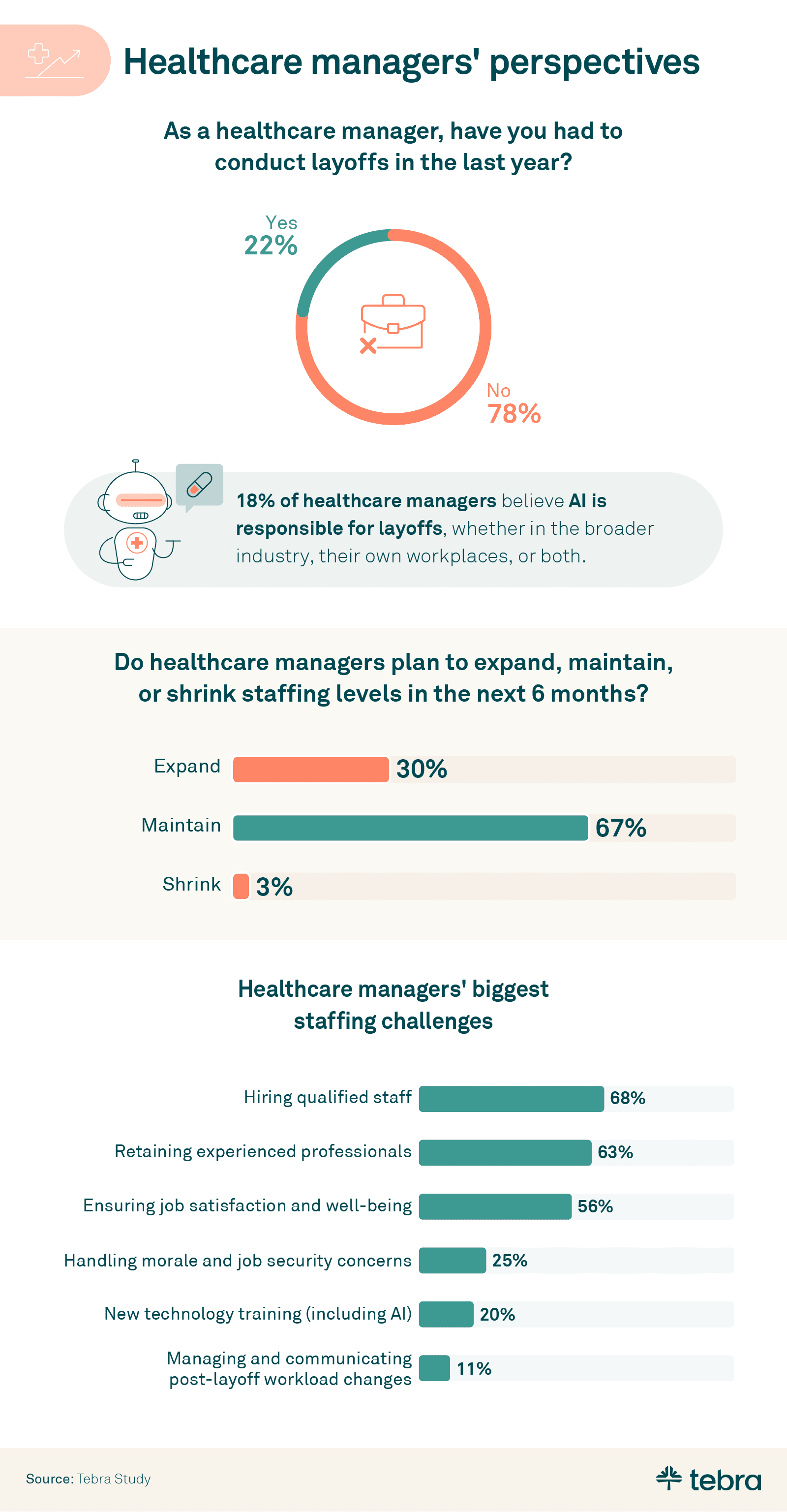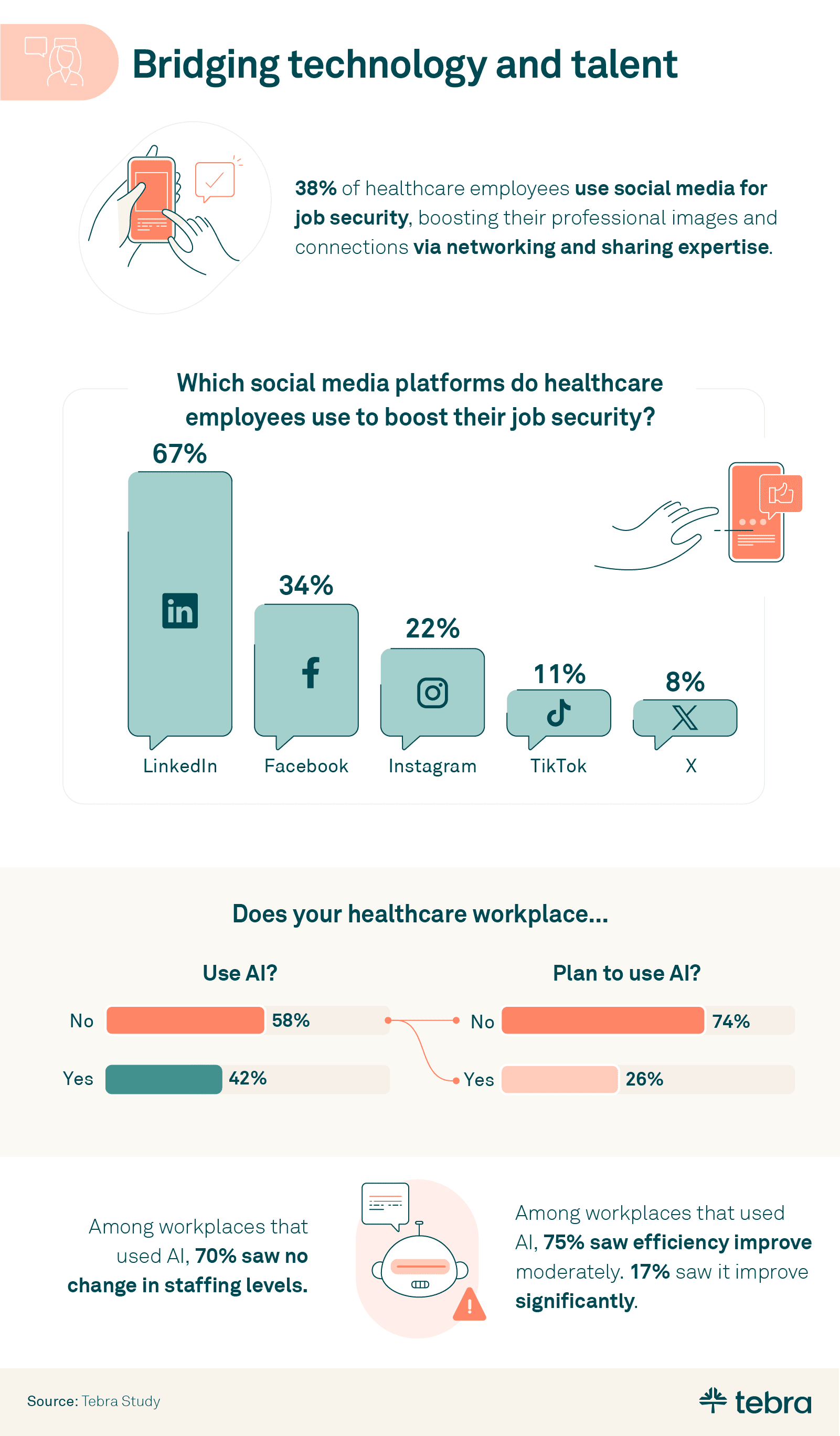In the rapidly evolving world of healthcare, employees and leaders face a labyrinth of challenges and opportunities. Healthcare professionals need to keep up with medical advancements while also grappling with changing workplace dynamics, and making decisions about their own futures such as the role AI could play in staffing and medical intelligence.
Tebra has a keen interest in capturing the pulse of this transformation, so we recently conducted a comprehensive survey to gain insights from 664 healthcare workers, including team members and the decision-makers who manage them. The results uncover the truths and struggles behind layoffs, the steps these professionals are taking in their careers as a result, and the role of cutting-edge technology such as AI in healthcare.
Key takeaways
- 28% of healthcare employees reported layoffs in their workplaces in the past year.
- 18% of healthcare managers blame artificial intelligence (AI) integration for these layoffs.
- However, 70% of AI-integrated workplaces saw no changes in staffing levels. Instead, 92% saw an increase in efficiency.
- 17% of healthcare workers aspire to become entrepreneurs in the industry.
- Post-layoff, healthcare workers saw an average salary boost of 8%.
Healthcare’s resilient path
In this era of digital transformation marked by rapid changes and challenges for professionals in many fields, how is the healthcare sector adapting? How have these professionals dealt with layoffs, and what are their aspirations?

The turbulence of the past year had 5% of our surveyed healthcare employees experiencing layoffs. Of those who kept their jobs, another 23% reported layoffs occurring within their workplaces. Among those let go, 47% had the advantage of securing new positions backed by recommendations from their previous employers. On average, these workers transitioned to new roles within three months, which could indicate a combination of the industry’s demand and their individual adaptability. In many cases, these transitions also came with a silver lining: an average salary boost of 8%.
So, what’s next for healthcare employees’ careers? A majority (63%) told us they prefer the comfort and reliability of stable full-time employment. However, a notable 17% had other business ambitions, looking to carve their own entrepreneurial paths in healthcare. An additional 9% aspired to healthcare management, 7% aimed to establish a private practice, and a bold 2% were ready to make waves by launching their own healthcare startups. For others (5%), interests extended to alternate areas of healthcare and beyond.
Managerial challenges in healthcare staffing
Managerial decisions shape the course of healthcare’s future as an industry. What challenges and strategies do these managers face as they steer their teams through staffing changes and technological evolution?

While 22% of healthcare managers had to make the challenging call of conducting layoffs in the past year, we saw a potential underlying perception among this group: 18% of healthcare managers attributed these layoffs to advancements in artificial intelligence (AI). Some experts link AI to layoffs across other industries as well, especially tech. But could this be true in healthcare?
We discovered a significant cause for optimism. A substantial 30% of managers shared plans to expand their teams, while even more — 67% — expressed intent to maintain them. Only a minimal 3% are considering cutting their teams back, painting a picture of stability for most healthcare workers.
However, managers have still experienced challenges lately. At the forefront of these was the struggle to recruit qualified medical staff — a concern for 68% of the managers we surveyed. Close behind was the challenge of retaining the invaluable experience of seasoned professionals, emphasized by 63%. Healthcare teams’ well-being and job satisfaction were also paramount concerns, according to 56% of managers.
Other common managerial challenges included providing continuous staff training (29%), keeping morale up and job security concerns down (25%), and training workers on new tech advancements like AI (20%). Only 11% shared that they’ve had trouble managing the repercussions of layoffs.
Digital healthcare dynamics
How are healthcare professionals adapting to their industry’s increased use of digital channels like social media and tech like AI? This section explores their ripple effects in healthcare workplaces.

This digital age offers a rich environment for healthcare professionals to achieve job stability, from becoming internet influencers (for better or worse) to staying up-to-date on networking opportunities. More than one-third of them (38%) told us they use social media for job security, whether by sharing professional expertise, providing valuable industry insights, or expanding their professional connections. Professional networking hub LinkedIn was their top choice for this (67%).
However, these professional uses also extended to platforms traditionally meant for leisure, especially Facebook (34%) and Instagram (22%). Even newer platforms like TikTok (11%) and the rebranded X (formerly Twitter — 8%) were in the mix.
Digital transformations like these weren’t limited to social media, as AI integration is rapidly spreading across the healthcare field. The effects of AI on healthcare workers are complex and varied, encompassing both positive and negative aspects — and 42% of our respondents said their workplaces have integrated this tech. Among the 58% of workplaces that have yet to use AI, over 1 in 4 are planning to adopt it. As for those whose companies have held back, 74% said they don’t see AI in their immediate future.
Although there are fears that AI will take jobs away from humans, healthcare’s AI integrations haven’t caused staffing disruptions for most of the professionals we surveyed. Of the workplaces that have embraced AI, a reassuring 70% saw no staffing changes. If anything, it’s helping improve operational efficiency. An impressive 75% of AI-adopting workplaces noted moderate efficiency improvements, while 17% highlighted a significant uptick.
Checking the pulse of healthcare
While challenges like layoffs and AI integration are reshaping certain aspects of the healthcare industry, the sector continues to show strength. Professionals aren’t just adapting; they’re strategically leveraging digital tools to secure their place in this fast-evolving field. Managers, in particular, remain committed to nurturing their teams, balancing the demands of a rapidly changing industry with their staff’s well-being. As we reflect on these insights, it’s evident that the future of healthcare employment, underpinned by dedication and innovation, remains bright.
Methodology
Tebra surveyed 664 individuals working in the healthcare industry. Our sample included 152 managers with hiring and firing authority, and the remaining 512 participants were employees working under such supervisors. Most respondents were women (72%), while the rest (28%) were men or identified as non-binary (1%). In terms of industry experience, 35% had been in the sector for less than five years, 33% between 5-10 years, 19% between 11-20 years, and 11% between 21-30 years. A seasoned 2% had over three decades of service. Generational representation comprised 4% Baby Boomers, 21% Gen X, 64% Millennials, and 12% Gen Z. Please note that percentages may not add up to 100 due to rounding.
We used filters on our survey platforms to ensure accurate targeting of a variety of healthcare industry roles, including: physicians, nurses, pharmacists, medical technicians, administrative staff, physician assistants, healthcare executives, therapists, optometrists, paramedics, medical assistants, dietitians, mental health professionals, practice owners, and operational managers.
About Tebra
Tebra is a leading provider of digital solutions tailored for independent healthcare practices. Through our practice automation platform, we equip practices with the necessary tools to enhance patient acquisition, streamline operations, and ensure timely payments. Our core mission centers on leveraging technology to elevate the standards of healthcare delivery and operational efficiency for practitioners.
Fair use statement
Should you find value in this article on healthcare industry insights, you are welcome to share it for non-commercial endeavors. Kindly link back to this original page in doing so, giving readers access to our comprehensive research and methodology.





